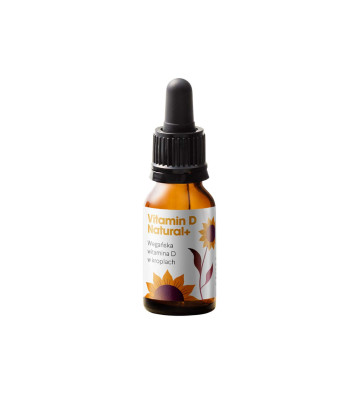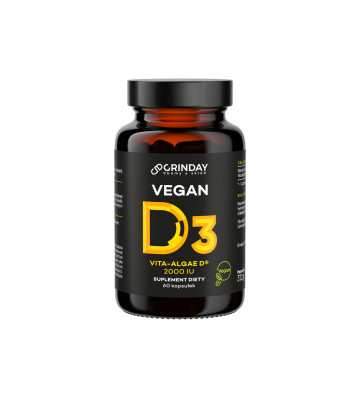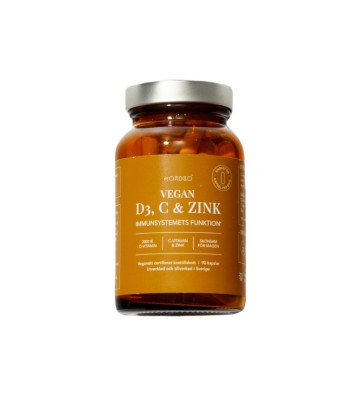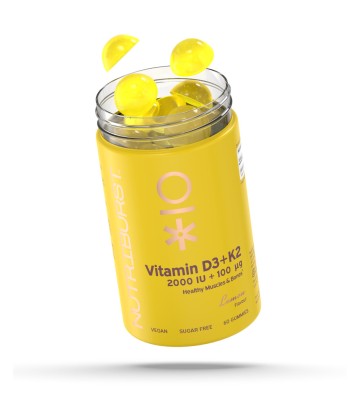Vitamin D is essential for all of us - supplementation is a must to stay healthy all year round. However, some groups are extremely vulnerable to its deficiency, which can lead to serious health problems. One of these groups is seniors, in whom weakened bones and decreased immunity can have dire consequences. Which vitamin D3 for seniors will be the best choice? What is associated with vitamin D deficiency in the elderly? Why is its intake essential? How to use it to bring the best results?
How does vitamin D work?
Vitamin D has many tasks to perform in our body. First of all, however, it regulates calcium and phosphate metabolism. It increases the absorption of calcium and phosphorus in the intestines, and this is crucial for bone health. In seniors, this is especially important because of the risk of osteoporosis, which already increases at around age 50. In addition, it supports the immune system by stimulating immune cells. This makes the body better able to fight infections, which is of considerable importance in the elderly. It affects the protection of neurons from oxidative stress, can reduce the risk of depression
[2], and even affects muscle function. Its effects are therefore versatile, and deficiencies can affect many systems in our bodies.

Why is vitamin D essential in a senior's diet?
The presence of vitamin D in the elderly is invaluable - it is crucial for:
- Healthy bones and teeth, as it aids in the absorption of calcium and phosphorus. This reduces the risk of osteoporosis, and thus fractures, which are extremely dangerous in seniors.
- The immune system, as it helps fight infections, which can be more serious in the elderly.
- Muscle health. Vitamin D deficiency in the elderly can lead to more frequent falls.
- Nervous system, as studies suggest that vitamin D supports cognitive function and reduces the risk of neurodegenerative diseases such as dementia[1].
- Mood improvement, as some studies indicate that vitamin D has a positive effect on mood. It can reduce symptoms of depression, which is very important especially during the winter.
- Regulating blood pressure, as it improves blood vessel function. This directly reduces the risk of high blood pressure, but also of related diseases such as strokes.
Unfortunately, as we age, the body's ability to naturally synthesize vitamin D declines. Supplementation is therefore all the more necessary.
 Immunity
Immunity
-12%
 Bones and joints
Bones and joints
-10%
 Immunity
Immunity
-5%
 Immunity
Immunity
-20%
Vegan D3, Vitamin C & Zink
Regular price
110.00 zł
Price
88.00 zł
The lowest price in the 30-day period before the reduction: 88.00 zł
0.98 zł / Unit
Exclusive here
 Bones and joints
Bones and joints
-10%
What is the best vitamin D3 for seniors?
The best vitamin D3 for seniors should meet several specific criteria. First of all, its form should be as easy as possible to administer and assimilate. Therefore, drops or gel capsules are the best and most common choice. They are well absorbed and convenient to administer even to people who have difficulty swallowing tablets (capsules are usually small). The best vitamin D3 for seniors will also contain supplements, such as vitamin K2 - so we can take care of the need for different substances in one administration. In addition, vitamin K also affects bone health, but also heart health. Remember, too, that the best vitamin will be the one that meets your needs. Before you decide on supplementation, do blood tests and consult your doctor. Perhaps you need small doses of vitamin D - 800 units per day. Or maybe your body has a higher need? Then 2,000 units or even more may be a good option. This, however, should be discussed with your health care provider. Remember, too, that vitamin D3 is better absorbed than vitamin D2. Also, choose supplements that give vitamin D3 in the company of oil. This is a fat-soluble vitamin.

What to take vitamin D with?
If you are wondering
what vitamins to take after age 65, vitamin D is certainly one of them. However, it is worth knowing in what company to take it. First of all, with fats - as we have already mentioned. So it's worth including it with a meal containing fats, such as avocados, nuts or oil. This will make its absorption more efficient. You can also combine vitamin D with magnesium - it supports the conversion of vitamin D to its active form in the body. Vitamin K2 is also a safe supplement, as it works together with vitamin D. It directs calcium to the bones, instead of depositing it in the arteries! So remember, it's not just the
vitamin D supplement that counts, but also what you combine it with.
Vitamin D supplementation - what to avoid?
The best vitamin D3 for adults won't help if you don't follow your doctor's and manufacturer's recommendations. And unfortunately, this can lead to health problems - as both deficiency and excess of vitamin D is harmful. Always take vitamin D with or after a meal, as supplementing on an empty stomach can significantly reduce the absorption of the supplement. It's also a good idea to find out whether some of the medications you take lower your vitamin D levels. While you probably can't give them up, this knowledge will help your doctor tailor supplementation to your needs.
Vitamin D in older people is absolutely essential - not only for maintaining healthy bones, but also for the immune system and well-being. Regular supplementation, preferably enriched with vitamin K, will go a long way toward improving quality of life in older age. Be sure to consult with your doctor to choose the right dose of supplementation.
Source












